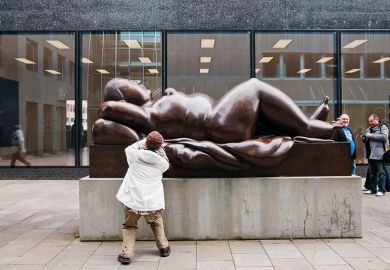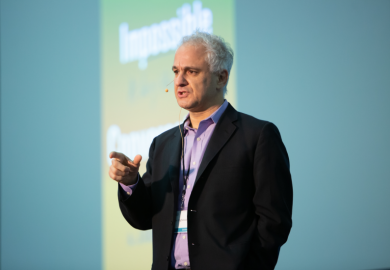Admirers of the Austrian-born philosopher Paul Feyerabend, who died in 1994, will be relieved that in his final work there was no mellowing of the radicalism of a man once described as assassinating his own specialism, philosophy of science. Thus, the point of his notorious claim that science is on an epistemological par with voodoo is retained in the claim that atoms or quarks are no less our "projections" than the Greek gods, the only difference being that these latter no longer "receive a response" from us moderns.
During his last years, Feyerabend was writing a book, never completed, which would be "simple ..., pleasant to read and easy to understand", and which would proceed, not systematically, but through reflection on significant "episodes" in "the history of common sense, philosophy, science and the arts". Conquest of Abundance consists of its editor's "collage" of Feyerabend's drafts for the book, together with a dozen published articles on cognate topics. Given the wide chronological and disciplinary range of the historical episodes discussed, the articles add valuable detail to themes only lightly sketched in the manuscripts.
The central theme is "the search for reality", an ambition which, Feyerabend thinks, makes sense only on the assumption that reality is largely "hidden" from us beneath the abundant variety of phenomena we experience. By "the conquest of abundance" he means the myriad attempts, deliberate or not, to thin down "the rich, colourful and abundant world that affects us in so many ways" to structures or entities supposedly underlying these - the gods to the one God, everyday objects to atoms, the welter of events to laws of nature, the fluid visual appearances of a thing to its "real" look as defined by Renaissance principles of perspective, and so on. It is not a conquest which, taken beyond a certain point, Feyerabend admires: on the contrary, the effect is typically to reduce a world "containing some life" to one which "lacks almost all the properties and events that make our existence important".
Feyerabend's question is the one pressed by Nietzsche: why this stubborn tendency to simplify and reduce? And his answer, like Nietzsche's, is in broadly pragmatic terms: the tendency reflects various "pressures" of life. Less time is spent on elaborating that answer, however, than on demolishing what both men are confident is the wrong answer. Pace the convictions of the "conquerors" themselves, reduction of the motley of experience to a simpler or underlying reality is not the product of reason or the application of sound method to the evidence. Feyerabend remains as "against method" as he was, back in 1975, in his famous book of that name. Historically, the great reductions have resulted from changes in fashion and other "pressures of life", not from proofs and arguments which invariably presupposed the new positions they purported to establish. Nor could it have been otherwise. A supposedly detached and rational theory can never capture the nature of reality, not only because to talk of the "real" at all is to talk of "what plays an important role in the kind of life one wants to live", but because the reality it claims to discover has already been stage-managed to fit the theory.
Claims like these led, unsurprisingly, to Feyerabend's being accused of holding that truth must be relative to incommensurable "world views". This is a charge he rejects in his final writings. In an aphorism he often repeated, "potentially every culture is all cultures". This is intended to convey that world views are not hermetically closed, since their leading concepts have an "ambiguity" - better, an open-endedness - which enables people from other cultures to engage with them. As Hans-Georg Gadamer would put it, there can be fusion even between distant horizons. It follows that relativism, understood as the doctrine that truth is relative to closed systems, can get no purchase.
It does not follow, on the other hand, that truth is to be found only in some single, overarching world view. The "material" which the world presents to human experience is "pliable", and may be "moulded" in different ways among which it would be invidious to select any one as the arbiter of reality.
The "pluralism" Feyerabend advocates is not something he works out in detail. Indeed, he veers between sympathy for the view that it is only the "symbolic", manifestations of an ineffable reality which we can ever encounter, and an "ontological pluralism" which "takes abundance at face value", cheerfully admitting as real many irreducibly "different kinds of objects and features". Be that as it may, the case for some form of pluralism is not only an epistemological one. For Feyerabend, both hermetic relativism and its absolutist rival serve, in their different ways, to "devalue human existence". The former encourages that unsavoury brand of political correctness which takes the refusal to criticise "other cultures" to the extreme of condoning murderous dictatorship and barbaric practices. The latter, especially in its favoured contemporary form of "scientific realism", with the excessive prestige it affords to the abstractions of "the monster 'science'", is in bed with a politics which likewise disdains variety, richness and everyday individuality - a politics which likewise "hides" its norms behind allegedly neutral facts, "blunts choices and imposes laws".
Ian Hacking describes Feyerabend as a humanist in the "old-fashioned" sense of someone for whom the arts are an essential antidote to a levelling, enervating, dehumanising "scientism". But he was also a humanist in the more recent sense of a philosopher who denies that there can be any account of the world which is not indelibly coloured by human concerns and ambitions. Humanism in that sense has often been charged with a refusal to measure our beliefs and values against an independent reality. It was Feyerabend's achievement to show that old-fashioned humanism requires new-fangled humanism. For it is only when we recognise that any describable world is "our world" that we shall retain that openness to the abundance of experience which the champions of "scientism" aim to conquer and reduce.
David E. Cooper is professor of philosophy, University of Durham.
Conquest of Abundance: A Tale of Abstraction versus the Richness of Being
Author - Paul Feyerabend
ISBN - 0 226 24533 0
Publisher - University of Chicago Press
Price - £19.00
Pages - 284
Register to continue
Why register?
- Registration is free and only takes a moment
- Once registered, you can read 3 articles a month
- Sign up for our newsletter
Subscribe
Or subscribe for unlimited access to:
- Unlimited access to news, views, insights & reviews
- Digital editions
- Digital access to THE’s university and college rankings analysis
Already registered or a current subscriber? Login



